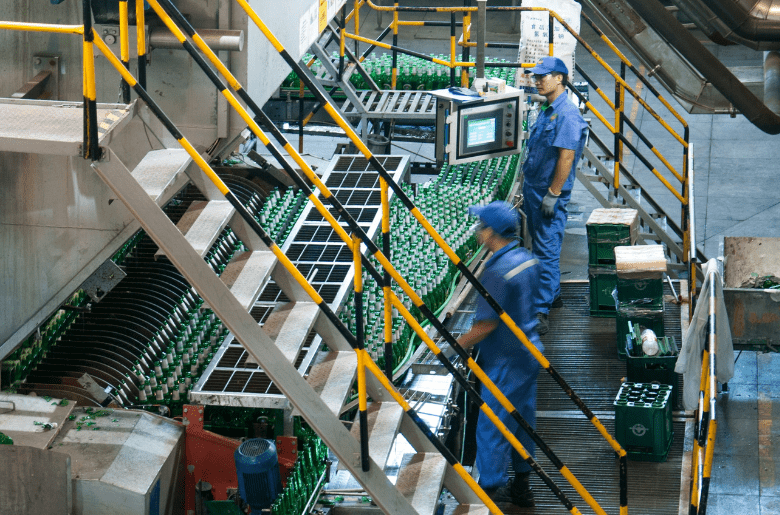Manufacturing ERP: Solutions for Every Unique Industry
Manufacturing ERP (Enterprise Resource Planning) refers to a software system specifically designed to meet the unique needs and challenges of the manufacturing industry. It integrates various aspects of manufacturing operations, such as production planning, inventory management, supply chain management, shop floor control, and financial management, into a centralized and cohesive system.
The primary goal of a manufacturing ERP system is to streamline and optimize the entire manufacturing process, from raw material procurement to finished product delivery. It enables manufacturers to effectively manage resources, increase operational efficiency, reduce costs, and improve overall productivity. For instance, well-known ERP solutions like SAP ERP and Microsoft Dynamics 365 offer robust features for large enterprises. Additionally, lesser-known solutions like Odoo ERP and ERPNext can be excellent choices for small to medium-sized manufacturers.
What makes us different from these well-known or lesser-known ERP solutions providers is that we provide 100% customized ERP solutions which can help your business skyrocket as per your expectations. Our tailored approach ensures that every aspect of the ERP system is designed to meet your unique business requirements, driving unparalleled efficiency and growth. Below is a comprehensive list of such systems.
We offer Manufacturing ERP Software Solutions for the following industries:
ERP for Pharmaceutical Industry:
Production of pharmaceutical drugs and medications.
ERP for Steel Industry:
Manufacturing of steel and steel products, including construction materials and machinery.
ERP for Electronics Industry:
Production of electronic components, consumer electronics, and communication devices.
ERP for Aerospace Industry:
Manufacturing of aircraft, spacecraft, and related components.
ERP for Machinery Industry:
Manufacturing of heavy machinery, industrial equipment, and machine tools.
ERP for Leather Industry:
Leather goods, accessories, upholstery, and fashion products. Footwear: Shoes, sandals, boots, and footwear manufacturing.
ERP for Plastics Industry:
Manufacturing of plastic products, packaging materials, and polymer components.
ERP for Automotive Industry:
Manufacturing of automobiles, including cars, trucks, and motorcycles.
ERP for Medical Devices Industry:
Production of medical equipment, instruments, and devices.
ERP for Wood Industry:
Timber products, furniture, construction materials, home décor products and woodworking.
ERP for Paper and Pulp Industry:
Production of paper, cardboard, and related products.
ERP for Chemical Industry:
See How My Company Can Massively Automate Your Company Departments
Custom CRM Development – For Organizations to manage its Customer Interactions in addition to Sales, Marketing, Billing, Products, Services, Contacts, Customer Support, among other things.
Custom ERP Development – For Manufacturers to handle BOM, Quotation, Order, RFQ, PO, SOA, Manufacturing, Trading, Inventory, Quality Control, Logistics, Shipments, and so on.

Manufacturing of various chemicals, including industrial chemicals, fertilizers, and pharmaceuticals.
ERP for Cable Industry:
Electrical cables, communication cables, and fiber optic cables.
ERP for Electrical Industry:
Electrical equipment, appliances, wiring, and power generation.
ERP for Energy and Utilities Industry:
Production and distribution of energy, including oil, gas, electricity, and water.
ERP for Packaging Industry:
Manufacturing of packaging materials and containers for various industries.
ERP for Mining Industry:
Extraction of minerals, metals, ores, and natural resources.
ERP for Consumer packaged goods Industry/FMCG:
Production of Fast-moving consumer goods including household goods, appliances, cosmetics and personal care products.
ERP for Rubber Industry:
Rubber products, tires, seals, gaskets, and industrial components.
Here are some Key Features and Benefits of a Manufacturing ERP Software:
Production Planning and Scheduling:
Manufacturing ERP helps in creating and managing production schedules, taking into account factors such as available resources, order priorities, and delivery deadlines. It optimizes production processes, reduces bottlenecks, and ensures timely order fulfillment.
Inventory Management:
The software provides real-time visibility into inventory levels, allowing manufacturers to track raw materials, work-in-progress (WIP), and finished goods. This helps in maintaining optimum inventory levels, reducing stock outs, and minimizing carrying costs.
Supply Chain Management:
Manufacturing ERP facilitates effective supply chain management by automating procurement processes, managing vendor relationships, and tracking supplier performance. It ensures a seamless flow of materials and reduces lead times.
Quality Control:
The system includes modules for quality control and assurance, enabling manufacturers to define and enforce quality standards throughout the production cycle. It helps in identifying and addressing quality issues, reducing defects, and improving customer satisfaction.
Shop Floor Control:
Manufacturing ERP offers shop floor control capabilities, allowing manufacturers to track and manage production activities in real-time. It provides visibility into work orders, machine utilization, labor allocation, and production progress.
Financial Management:
The software integrates financial modules, such as general ledger, accounts payable, accounts receivable, and cost accounting. It enables accurate tracking of costs, revenue, and profitability associated with manufacturing operations.
Reporting and Analytics:
Manufacturing ERP generates comprehensive reports and provides analytical tools for monitoring key performance indicators (KPIs) and making informed business decisions. It offers insights into production efficiency, resource utilization, inventory turnover, and other critical metrics.
Compliance and Regulatory Support:
Manufacturing ERP systems often incorporate features to help manufacturers comply with industry regulations and standards. It ensures adherence to safety, environmental, and quality regulations, reducing compliance risks.
Implementing a manufacturing ERP system can offer several benefits, including:
- Improved efficiency and productivity by automating manual processes and eliminating redundant tasks.
- Enhanced visibility and control over the entire manufacturing operations.
- Reduction in lead times, production cycle times, and overall costs.
- Better decision-making through accurate and real-time data analysis.
- Increased customer satisfaction with improved order accuracy and on-time delivery.
- Streamlined collaboration among various departments and stakeholders.
- Scalability to accommodate business growth and changing manufacturing needs.
Overall, a manufacturing ERP system plays a crucial role in optimizing manufacturing processes, driving operational excellence, and enabling manufacturers to stay competitive in a dynamic and fast-paced industry.
